

Everything You Need to Know About Work Passes in Singapore
By SGN | Updated 10 Jun 2024

If you’re a foreign professional looking to work in Singapore, you must hold a valid work pass (otherwise known as a visa) before starting work. Learn which passes suit you best, if you’re eligible, and how to apply.
Overview of Work Passes
Here’s a list of passes for skilled professionals that Singapore offers:
Employment Pass (EP)
Personalised employment pass (pep).
- Overseas Networks & Expertise Pass (New!)
If you’re a trainee or student, you may wish to view additional passes available here .
Long-Term Work Passes
Who it’s for: Professionals, managers and executives Who applies: Employer Min. salary: S$5,000 (S $5,600 starting from Jan 2025; for finance professionals, the new minimum will be S$6,200) Validity: Up to 2 years for new passes; up to 3 years for renewals; 5 years for experienced tech professionals with skills in shortage and minimum salary of S$10,500
The Employment Pass (EP) is designed for professionals with a minimum monthly salary of S$5,000 (S$5,500 for the financial sector). This minimum increases progressively with age, up to S$10,500 for candidates aged 45 and above. The Employment Pass (EP) is designed for professionals with a minimum monthly salary of S$5,000 (S$5,500 for the financial sector). This minimum increases progressively with age, up to S$10,500 for candidates aged 45 and above. Starting from Jan 2025, this will be adjusted to S$5,600 and S$6,200 for the financial sector. For EP renewal applications, the new qualifying salary will only take effect on Jan 1, 2026.
If you’re running on a tight timeline, you’ll be glad to know that since late 2022, the processing time for the Employment Pass has been reduced to 10 business days.
New applicants will be evaluated based on the Complementarity Assessment Framework (COMPASS) , with the exception of candidates drawing a salary of S$22,500 and above.
Who it’s for: EP holders or professionals earning a high salary Who applies: Pass candidate Min. salary: S$18,000 Validity: Up to 3 years
The Personalised EP is a non-renewable visa that offers high earners greater flexibility. It is not tied to a sector or an employer, and holders may be unemployed for up to 6 months.
First-time applicants must have a salary of at least S$18,000. From September 2023, this minimum will be raised to S$22,500.

Specialised Passes
Who it’s for: Entrepreneurs looking to run an innovative/venture-backed business in Singapore Who applies: Pass candidate Min. salary: NA, but candidates must meet other criteria Validity: 1 year for new passes and first renewal; 2 years for subsequent renewals
Targeted at high-calibre entrepreneurs, the EntrePass encourages the starting of venture-backed or innovative tech businesses in Singapore.
While there is no minimum salary tied to this pass, candidates must meet at least one of a list of criteria , such as holding an intellectual property (IP) or engaging in research collaborations with Singapore institutions.
Overseas Networks & Expertise (ONE) Pass (New!)
Who it’s for: Top talent with deep skills and expertise across all sectors, including business, technology, science, engineering, arts, sports and academia Who applies: Pass candidate or employer Min. salary: S$30,000 or demonstrate outstanding achievements in arts and culture, sports, or academia and research Validity: 5 years
Introduced in 2023, the ONE Pass is a personalised work visa which allows top talent in business, arts and culture, academia and research, and sports to start, run or work for multiple companies in Singapore. To qualify, applicants must earn at least S$30,000 a month or have outstanding achievements in their field.
Aside from the long validity period, another key highlight of this pass is that spouses will be able to work on a Letter of Consent. Candidates will also not be subject to the COMPASS framework. For more details on the ONE pass, refer to our article here .
Who it’s for: Established tech entrepreneurs and leaders Who applies: Pass candidate Min. salary: S$20,000 Validity: 2 years
The Tech.Pass, launched in 2020, is a visa for accomplished tech leaders, experts and entrepreneurs. It allows them to start, work for or invest in multiple Singapore companies.
Applicants must fulfil two out of three conditions:
- Have a last drawn fixed monthly salary (in the last 1 year) of at least S$20,000
- Have at least five cumulative years of experience in a leading role in a tech company with a valuation/market cap of at least US$500mil or at least US$30mil funding raised
- Have at least five cumulative years of experience in a leading role in the development of a tech product that has at least 100,000 monthly active users or at least US$100mil annual revenue

Family Passes
Bringing family with you? There are two types of passes you can obtain for your loved ones:
- Dependant’s Pass for a legally married spouse or unmarried children under 21
- Long-Term Visit Pass (LTVP) for parents or a common-law spouse.
Specific requirements depend on the pass you have. EP holders must earn at least S$6,000 (S$12,000 for parental LTVP), EntrePass holders must fulfil certain business spending and employment criteria, while ONE Pass holders have no additional criteria.
For more details, refer to the full lists of Dependant Pass criteria and LTVP criteria .
Lastly, take note that a Letter of Consent is required if the Dependant or LTVP holder wishes to work or run a business in Singapore.
We hope this guide has given you a clearer understanding of work pass options in Singapore. For more info, please head to the Ministry of Manpower’s website .
Join our community today
Recommended for you.

Meet the Kyrgyz tech entrepreneur building Super Apps in Singapore

Meet the founder of the first Singaporean ride-hailing firm listed on NYSE

Meet the AI founder who created a Talkbot that understands Singlish

This Singaporean is a Master Perfumer & Dean of a Perfumery School

How this S’porean became a technopreneur in Hawaii & consultant to Bhutan

Your National Day 2024 Checklist: Here’s How You Can Celebrate

Meet the Singaporean who turned his home into a living Peranakan Museum

This German hotelier settled in Singapore after living in 15 countries. Here’s why.

Meet Nir Eyal, the best-selling author unraveling tech addiction
Singapore global network.
- Privacy Statement
- Terms of Use
- Report Vulnerability
Copyright © 2024, Government of Singapore
Last Updated: 27th August 2024
Press enter to see results or esc to cancel.

The Ultimate Guide to Long Term Visit Pass (LTVP) in Singapore
If you are an expat employee based in Singapore and would like to bring your family or your significant other to the country, the long-term visit pass (LTVP) is your best bet. But there are certain criteria that need to be met on the part of both the applicant and the dependents.
In this Pacific Prime Singapore article, we will explain the details of the LTVP and the type of insurance suitable for its holders.
What is a Long-Term Visit Pass (LTVP)?
The Long-Term Visit Pass (LTVP) is a type of pass designed for certain family members of an Employment Pass or S Pass holder.
Foreign partners of Singapore Citizens (SCs) or Singapore Permanent Residents (SPRs) are eligible for the Long Term Visit Pass-Plus (LTVP+) system. Foreign partners of SCs who apply for LTVP will be immediately considered for LTVP+ if they’re qualified.
It provides foreign partners of SCs with an extended period of residency, increasing their chances of staying in the country. Upon approval, they can stay in Singapore for three years initially, and if their LTVP+ is renewed, they are allowed to reside for five years.
The best part is that LTVP+ holders are entitled to healthcare and employment benefits.
A foreign employee can apply for a Long Term Visit Pass for their family if they meet these requirements:
- Hold an Employment Pass or S Pass
- Earn a minimum salary of SGD $6,000
- Are sponsored by an established, Singapore-registered company (usually the employer)
Eligible applicants can then get a pass for the following family members:
- Common-law spouse
- Unmarried handicapped children above 21 years old
- Unmarried step-children under 21 years old
- Parents – only for those earning a fixed monthly salary of at least $12,000
How to Apply for a Long-Term Visit Pass
Below is a quick summary of the LTVP application procedures:
- Fill out the Long Term Visit Pass Application Form and include the supporting documents.
- Submit the application as well as the supporting documents over the counter at any SingPost branch.
- Pay SGD $105 for each application by cash, NETS, or CashCard. Remember to keep the payment advice slip as proof of submission.
- Request for the pass to be issued. You’ll have to be in Singapore to claim the pass.
- Register fingerprints and photos of your dependents. You can check the letter of notification issued to know whether you need to register the fingerprints of your dependents and have their photo taken. If you’re registering for the first time or your last registration was more than 5 years ago, you will need to register.
- Collect the LTVP card. The card should be delivered to the specified address in your application form 4 working days after you register and get your documents verified.

What Types of Insurance are Suitable for LTVP Holders
Insurance is particularly crucial to LTVP holders because they are not entitled to MediShield Life insurance coverage or the same level of government subsidies that Singaporeans and Permanent Residents enjoy.
Below are the three types of insurance for your important ones holding a Long-Term Visit Pass:
Health Insurance
Most, if not all, health insurance plans come with hospitalization protection. As we all know, the healthcare costs in Singapore are by no means easy on the wallet. Comprehensive hospitalization insurance coverage can ensure that you will not need to pay out-of-pocket for the medical bill and that your dependent can fully focus on recovery.
Personal Accident Insurance
A personal accident plan goes a long way in protecting your dependent against a slew of potential perils and accidents such as food poisoning and car accidents. A solid accident insurance policy should cover accidental death and permanent disability, as well as offer insurance benefits for reimbursement of medical treatment due to accidents.
Critical Illness Insurance
Critical illness offers additional coverage for medical emergencies like heart attack and stroke and can compensate for where traditional health insurance may fall short. After all, critical illnesses may not only result in a hefty medical bill but also loss of income or even the need to hire a full-time caretaker.
Update for LTVP Holders
LTVP holders should note that, according to the government, they will not be eligible for the solidarity payment under the Solidarity Budget in 2020. However, they are still entitled to benefits as part of a Singaporean household, such as GST vouchers, U-save rebates and special payment, as well as service and conservancy charges rebates.
A digital Long-Term Visit Pass (LTVP) will be provided in place of a physical LTVP card starting on February 27, 2023.
The digital LTVP can be viewed through the Singpass app or saved in PDF or OA format through MyICA or FileSG. Anyone who is unsure about the authenticity of a digital LTVP can check on the FileSG website .
Contact Pacific Prime Today
Whether you’re looking for health insurance for expats , international health insurance , short term health insurance , family health insurance , Pacific Prime Singapore can help. With over 20 years of experience and multiple offices across the world, we are an established insurance advisory specialized in international health insurance and employee benefits. Our team of experts are on hand to match you with the best plan that matches your needs. Contact us today for impartial advice, an obligation-free quote, and a plan comparison

Related posts:
Recent posts.
- The Cost of Comprehensive Health Screenings in Singapore in 2023 - October 17, 2023
- How Long is Paternity and Maternity Leave in Singapore? - August 11, 2023
- The Ultimate Guide to Long Term Visit Pass (LTVP) in Singapore - May 24, 2023
Anthony Chan
With over 13 years of experience in bilingual content creation and digital marketing, Anthony Chan is a seasoned writer and editor for Pacific Prime and its subsidiary, Kwiksure. Leveraging his deep understanding of local and international insurance landscapes, he crafts a diverse range of online and offline articles, reports, e-newsletters, videos, and more.
His expertise encompasses a broad range of areas including international health insurance, employee benefits solutions, motor insurance, life insurance, and various other forms of general insurance. This breadth of knowledge enables him to distill an array of complex insurance concepts into a series of progressive, easily understandable articles.
Anthony earned his Bachelor of Arts degree from Lingnan University, majoring in Translation and minoring in English. He also studied at West Virginia University in the United States as an exchange student.
When he’s not working, Anthony can typically be found on the badminton court, in the gym, or at the theatre.
Comments for this post are closed.
About pacific prime singapore.
Pacific Prime Insurance Brokers Singapore Pte. Ltd. is one of Singapore's top registered insurance brokers. Primarily focused on health insurance in Singapore, we also offer a wide spectrum of insurance solutions from automobile through to wellness.
All of our innovative insurance solutions are backed by industry-leading technology and expert, award-winning service from our team of advisors.

Find an Article
- Skills-Based Hiring Is Becoming More Popular with Employers
- New Application Requirements for Professional Visit Pass of Malaysia
- Find Personalized Healthcare in Singapore with Telemedicine
- Tips To Secure a Job with Ease as a Foreigner in Singapore
- How to Beat the Heat Wave in Singapore: Indoor & Outdoor Tips
- The Role of HR in Cyber Risk Management
- Wide Variation in Integrated Shield Plan Lifetime Premiums Revealed by MOH Comparison
Top 100 Insurance Blogs Winner

- +65 8802 6440
- [email protected]

- Global Investor Program
- Seminar Registration
- Partner With Us

All You Need to Know About Long-Term Visit Pass (LTVP) Application in Singapore
- by SGTI_Admin
- May 9, 2023 April 19, 2024

With the LTVP (MOM) , foreigners with work passes can bring in additional family members to stay in Singapore. Additionally, Singapore citizens and Permanent Residents (PRs) can also sponsor LTVP (ICA) for their family members.
The Long-Term Visit Pass (LTVP) application is specifically designed for individuals who want to stay in Singapore for a longer duration with their direct family members without the inconvenience of applying for a new visa every few months.
If you’re considering applying for an LTVP in Singapore, our article will guide you through the eligibility criteria, application process, and LTVP renewal procedure. Furthermore, we will explore the benefits of LTVP Plus (LTVP+), an enhanced version of the pass that offers even more perks. Don’t miss out on the opportunity to bring your loved ones to Singapore for a long-term visit!
Different Types of Long-Term Visit Passes in Singapore
If you’re planning a long-term stay in Singapore, you may need to apply for a Long-Term Visit Pass (LTVP). There are two types of LTVPs that you can apply for, each issued by a different authority:
This pass is essentially an extension of an existing Short-Term Visit Pass for family members of Singapore citizens and Permanent Residents (PRs). It is suitable for foreign visitors who wish to stay in Singapore for more than the 30 days allowed by a Short-Term Visit Pass.
This pass is intended for the family members of foreign employees who are not eligible for a Dependant’s Pass but want to live with their loved ones in Singapore.
What is LTVP+?
The Long-Term Visit Pass-Plus (LTVP+) scheme was introduced to assist Singaporean families with foreign spouses. This new scheme offers foreign spouses of Singapore citizens who qualify a longer period of residency, providing them with greater certainty of stay. The LTVP+ also offers a range of benefits, including access to healthcare and employment opportunities.
Couples with at least one Singaporean child from their marriage are eligible to apply for the LTVP+. For those without a Singapore Citizen child, the Immigration and Checkpoints Authority (ICA) will consider other factors, such as the duration of marriage, and generally look more favourably upon those who have been married for at least 3 years.
LTVP+ holders will be eligible for a longer period of residency in Singapore, with the LTVP+ being valid for 3 years in the first instance and for up to 5 years for each subsequent renewal. Additionally, LTVP+ holders will receive healthcare subsidies for inpatient services at restructured hospitals, which are set at a level close to that for Permanent Residents.
Furthermore, LTVP+ holders seeking work in Singapore will find it easier to do so. Prospective employers of LTVP+ holders can apply to the Ministry of Manpower (MOM) for a Letter of Consent (LOC) on their behalf, instead of an Employment/S Pass or Work Permit.
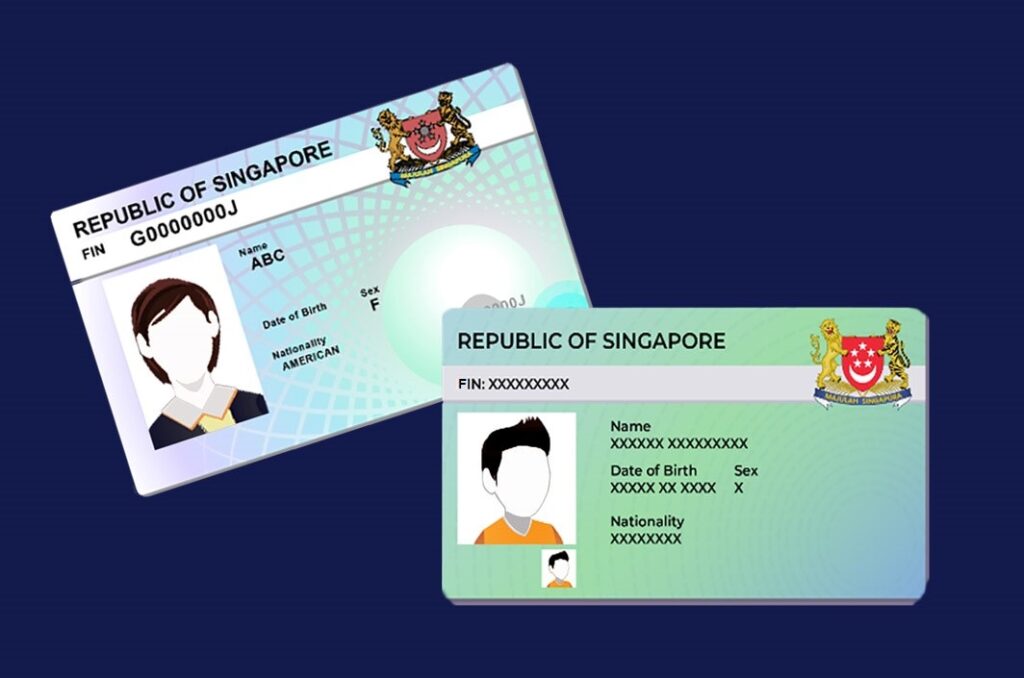
Eligibility Criteria for Applying for a Long-Term Visit Pass (ICA) in Singapore
To be eligible for a Long-Term Visit Pass (LTVP) issued by the Singapore Immigration and Checkpoints Authority (ICA) , the requirements vary depending on the type of pass you are applying for. Here are the criteria for applying for an LTVP with ICA:
- You are the spouse of a Singapore citizen or permanent resident.
- You are the dependant child of a Singapore citizen or permanent resident and are below the age of 21.
- You are the parent of a Singapore citizen or permanent resident.
- You are a graduate from a higher learning institution who intends to be employed in Singapore.
- You are the mother or grandmother of a young foreigner who is studying in Singapore with a Student’s Pass.
- You are a foreigner seeking permission to give birth in Singapore.
Applicants who meet the above eligibility requirements may apply for an LTVP with ICA, which allows for an extension of stay beyond the typical short-term visit pass duration.
Eligibility Criteria for Applying for a Long-Term Visit Pass (MOM) in Singapore
To be eligible for a Long-Term Visit Pass (LTVP) issued by the Ministry of Manpower (MOM) , you must meet the requirements that vary depending on the type of work pass you hold. You can apply for an LTVP for your family member if you meet all the following conditions:
- You must hold an Employment Pass (EP), S Pass, Personalised Employment Pass (PEP), Overseas Networks & Expertise (ONE) Pass or EntrePass.
- You must earn a minimum fixed monthly salary of $6,000. This is based on your salary and not on your combined household income.
- You must be sponsored by an established, Singapore-registered company (usually your employer).
You can get a pass for the following family members:
- Your common-law spouse.
- Your unmarried handicapped children aged 21 and above.
- Your unmarried step-children under 21 years old.
- Your parents – only if you are earning a fixed monthly salary of at least $12,000 .
Here are the steps for applying Long-Term Visit Pass (LTVP) at the Immigration and Checkpoints Authority (ICA) in Singapore:
- Gather all the required documents for the LTVP application. The Immigration and Checkpoints Authority (ICA) website contains detailed information regarding the specific documents required for each type of application.
- Go to the ICA website and access the LTVP e-Service. Fill in the application form and upload all the required documents. You will also need to pay the application fee online.
Note: LTVP application by foreign spouse of Singapore citizen who did not complete the Pre-Marriage Long-Term Visit Pass Assessment (PMLA) will take longer, up to 6 months to be processed.
- If your LTVP application is approved, you will receive the email notification.
- Upon in-principle approval of the Long-Term Visit Pass (LTVP) application, you can enquire the application status and download the term and conditions for issuance of LTVP and medical report form (for those who are required to undergo a medical check-up). The applicant must upload the completed forms within 30 days from the in-principle approval date. Otherwise, the application will be considered withdrawn.
- Once the uploaded document(s) are verified by ICA, the applicant will be notified via email to make payment using the e-Service . Payment of S$60 for applicant’s LTVP and S$30 for a Multiple Journey Visa (if applicable) must be made within 30 days upon receiving the email notification, otherwise the approval will be withdrawn.
- Once the payment has been made, the applicant will be informed if he/she is required to visit ICA Building physically for the issuance of LTVP. If applicant is required to visit ICA Building, the applicant can download the In-Principle Approval (IPA) letter which is valid for three months from date of issue. With effect from 27 February 2023, a digital Long-Term Visit Pass (LTVP) will be issued in place of a physical LTVP card.
Here are the steps for applying Long-Term Visit Pass (LTVP) at the Ministry of Manpower (MOM) in Singapore:
- Gather the necessary documents for the application. Depending on the family member you are applying for, you may also be required to submit additional documents. The Ministry of Manpower (MOM) website contains detailed information regarding the specific documents required for each type of application.
- Your Long-Term Visit Pass (LTVP) application can be submitted online via myMOM portal by your employer or Employment Agency (EA). It is essential to complete all mandatory fields and provide the relevant supporting documents. Additionally, an application fee of S$105 must be paid before submitting the application.
- The processing time for Long-Term Visit Pass (LTVP) application varies and can take up to 8 weeks. You can check the status of your application on the MOM website.
- If your application is approved, you will receive the in-principle approval (IPA) letter via email. The applicant must enter to Singapore within 6 months (for EP holder) or 2 months (for S Pass holder) from the date of approval.
- An email notification letter will be sent to you, which will remain valid for 1 month. This notification will contain instructions on completing the card registration process, which includes paying the approval fees of S$225 for each pass, and S$30 for a multiple journey visa (if applicable). The card registration formalities comprise undergoing a medical check-up, registering fingerprints, and having your photo taken.
- After completing the registration process and your documents are verified, the Ministry of Manpower (MOM) will dispatch the card to the provided address within 5 working days.
Long-Term Visit Pass (LTVP) Renewal
To renew an LTVP issued by the ICA , you need to apply at least 2 months before your current LTVP expires. This is to ensure that your application can be processed and approved before your current pass expires. You can apply for renewal online through the ICA’s e-Service portal.
If your LTVP is issued by the MOM , you can apply for renewal up to 6 months before it expires. It is recommended that you start the renewal process early to allow for any delays in processing. Your employer or EA can apply for renewal through the EP Online.
It is important to note that renewals are not guaranteed. You will still need to meet the eligibility criteria and provide all the necessary documents for evaluation.
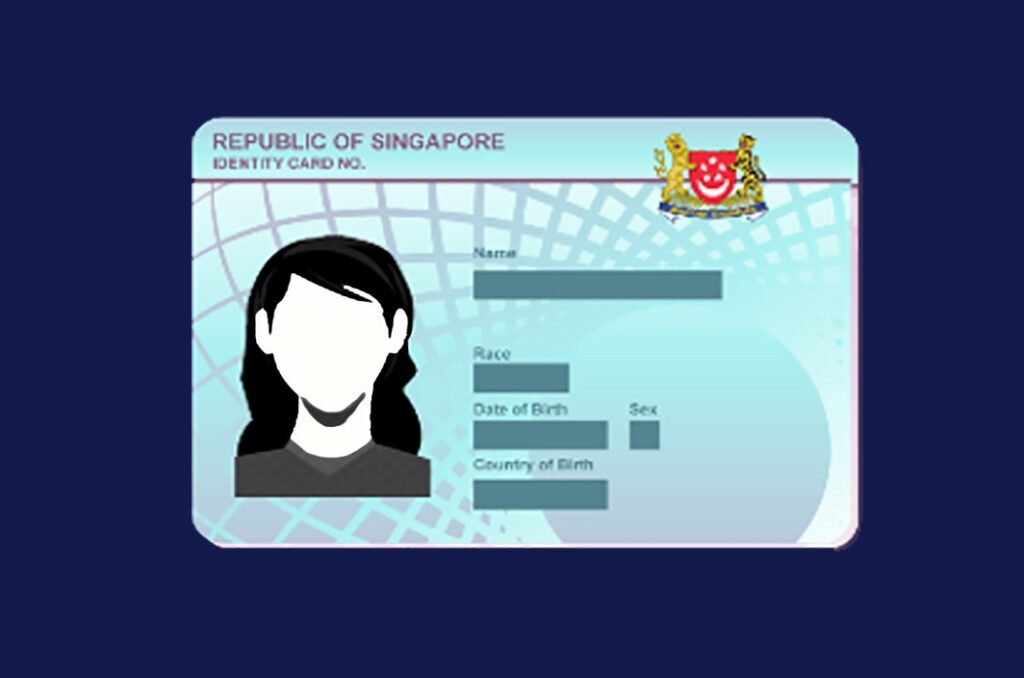
What’s Next?
If you have been granted a Long-Term Visit Pass (LTVP) in Singapore, you may be wondering what your next steps should be. One option to consider is applying for permanent residency (PR) in Singapore, which offers greater stability and benefits, such as access to government-funded healthcare and education, and lower costs for housing and other expenses.
To apply for PR, you must meet certain eligibility criteria, including having a stable income, contributing to the local community, and demonstrating a commitment to living in Singapore long-term. Additionally, you will need to fill out an application and submit the required documents to ICA.
The application process can take several months, so it is crucial to ensure that your documentation is complete and accurate before submitting it. If you are unsure about any aspect of the application process or whether you meet the eligibility criteria, our team of experienced immigration consultants can provide further guidance. We have also developed a profile assessment tool that utilizes our collective knowledge and expertise to help determine your likelihood of obtaining Singapore PR.
Overall, applying for PR can be an excellent way to secure your future in Singapore and enjoy the many benefits that come with being a permanent resident. Check out our article on the 10 benefits of becoming a Singapore Permanent Resident to learn more. If you have an LTVP and are considering your next steps, it is worth exploring the possibility of applying for PR .

A complete guidance that you won’t find anywhere else!
Our Services
- Singapore Permanent Residence Application
- Singapore Citizenship Application
- Work Pass Application
- Long-Term Visit Pass Application
- Business Relocation Service
- 10 Anson Road, #15-04, International Plaza Singapore 079903

Singapore Long Term Visit Pass (LTVP/ LTVP+) Guide 2023
What’s in this article, singapore long term visit passes (ltvp) eligibility, key information about the singapore long term visit pass, documents required for long term visit pass (ltvp) in singapore.
- Application Process for Long Term Visit Pass (LTVP) in Singapore
How Much Does a Long Term Visit Pass (LTVP) in Singapore Cost?
Can i apply for permanent residency (pr) with ltvp, what is a long-term visit pass+, eligibility requirements for long-term visit pass+, book a consultation for your business expansion today..
A Singapore Long-Term Visit Pass (LTVP) is obtained for foreigners that are looking to stay in the country for more than 30 days. They usually come over to start up their business , or to work in Singapore .
There are different types of work passes issued by the government authorities and the requirements and processes are unique and different. First off, let’s talk about who are eligible for Long-Term Visit Passes.
P1, P2 Employment Pass holders and S Pass may apply for Long Term Visit Passes for their:
- Common-law Spouse
- Unmarried Handicapped children above 21 years of age
- Unmarried Step-children under 21 years of age
Parents and parents-in-law, only for those earning a fixed salary of at least $12,000
Provided you are:
Earning fixed monthly salary of more than or equal to $6,000
- Sponsored by an established, Singapore registered company
Other categories of individuals who are eligible to apply for the LTVP according to Singapore’s Immigration and Checkpoints Authority (ICA) include:
- Visitors who are holders of foreign-issued educational certificates seeking employment in Singapore
- Visitors who are students of institutes of higher learning seeking employment in Singapore
- Female visitor whose child/grandchild is studying in Singapore on a student’s pass
- Visitor whose spouse is a Singapore citizen (SC) or Singapore Permanent Resident (SPR)
- Visitor (below 21 years old) whose parent is an SC or SPR.
- Visitor whose child (above the age of 21 years old) is an SC or SPR.
- Visitor seeking permission to deliver a child in Singapore
- Visitor seeking long term stay
Some of the key notes that you should know about the LTVP in Singapore re:
LTVP holders can be granted up to 2 year’s stay in Singapore, subjected to the application and outcome by ICA
LTVP holders are not eligible to work in Singapore unless they have a valid work visa , such as the Employment Pass , or by starting their own company .
The following are the documents required for the application of a Long-Term Visit Pass in Singapore:
1. LTVP Application Form
The applicant must be sponsored by a well-established Singapore-registered company, normally the employer of the Employment Pass holder.
The form must be endorsed with the company’s stamp or seal, and signed by the applicant and an authorised officer from the sponsoring company.
2. Photograph of the applicant (passport-sized and taken within last three months)
3. personal particulars page of applicant’s passport/travel document, 4. copies of passport details and birth or marriage certificates, application process for long term visit pass (ltvp) in singapore .
It can take up to typically 3 weeks for Non-Sponsorship holders and 8 weeks for Sponsorship holders.
To be completed by the Employer:
- Submit an LTVP application
- Bring the intended pass holder into Singapore
- Get issued the pass issued
To be completed by the Foreigner:
- Register fingerprints and photo
- Receive the card
You must fill up the application form and gather all the required documentations. After that, you may proceed to submit the LTVP application and wait for a response from the Ministry of Manpower.
You will receive an in-principal letter of approval (IPA) if you successfully complete this process. It is only then you can invite your family members, which will be the ones you will be supporting.
A $30 fee will be required through a valid card while waiting for the LTVP to be processed.
Upon approval, a $60 fee will be required for the Pass alone.
The Long-Term Visit Pass (LTVP) is a visa category in Singapore intended for family members of eligible Employment Pass (EP) or S Pass holders. While the LTVP itself does not directly grant eligibility for Permanent Residency (PR), it can play a supporting role in the PR application process. We will discuss the relationship between LTVP and PR eligibility, highlighting how having an LTVP can contribute to a stronger PR application.
LTVP and PR Application:
a) Different Visa Categories: The LTVP is specifically designed for family members of EP or S Pass holders, providing them with extended stay privileges in Singapore. On the other hand, PR is a status that grants long-term residency rights to individuals, independent of their relationship to EP or S Pass holders.
b) Supporting Documentation: Holding an LTVP can strengthen a PR application by providing documented evidence of an individual’s extended stay in Singapore and their familial ties to a skilled foreign professional employed under EP or S Pass.
Factors Considered in PR Eligibility:
a) Employment History: PR applicants are evaluated based on their employment history, including the duration and stability of their employment in Singapore. Holding an LTVP may indicate a longer-term commitment and stability in residing in the country.
b) Contribution to the Local Economy: The extent of an applicant’s contribution to Singapore’s local economy, such as skills, expertise, or investments, is a crucial consideration in PR eligibility. Holding an LTVP demonstrates the applicant’s involvement in a family unit that supports a skilled foreign professional’s employment in Singapore.
c) Length of Stay and Integration: PR applications assess the length of an individual’s stay in Singapore and their integration into the local society. Holding an LTVP provides a longer-term stay in the country, potentially strengthening the applicant’s integration and familiarity with Singapore’s culture and values.
If you are the foreign spouse of a Singapore Citizen or Singapore Permanent Resident , you may be eligible for a Long Term Visit Pass+ (LTVP+). Applicants for the LTVP who are foreign spouses of Singapore citizens will be considered automatically for the LTVP+.
As an LTVP+ holder, you may be eligible for the following benefits:
- Allowed to stay in Singapore for 3 years as compared to a usual LTVP holder of 2 years
- Upon renewal, LTVP+ holders will be allowed to stay in Singapore for 5 years as compared to a usual LTVP holder of:
- 3 months as a Dependent of an Employment Pass holder
- 2 months as a Dependent of a S Pass Holder
The Long Term Visit Pass (LTVP) is available to Employment Pass and S-Pass holders in Singapore. As sponsors, they have the option to apply for the LTVP on behalf of the following individuals:
Common-law spouse
Handicapped daughters above 21 years of age
Handicapped children above 21 years of age
Stepchildren
Additionally, according to the Immigration and Checkpoints Authority (ICA), the LTVP is open to the following categories of people:
Visitors with foreign-issued educational certificates seeking employment in Singapore
Students of institutes of higher learning seeking employment in Singapore
Female visitors whose child/grandchild is studying in Singapore on a student’s pass
Visitors whose spouse is a Singapore citizen (SC) or Singapore Permanent Resident (SPR)
Visitors below 21 years old whose parent is an SC or SPR
Visitors whose child above the age of 21 years old is an SC or SPR
Visitors seeking permission to deliver a child in Singapore
Visitors seeking long-term stay
Under the LTVP Scheme, the duration of stay granted in Singapore can vary depending on the specific application, with a maximum of 2 years. It’s important to note that LTVP holders are not permitted to work unless they possess a work permit, S Pass, or Singapore work visa.
MAKE YOUR MOVE TO SINGAPORE TODAY
Come down to our office or get in touch virtually for an assessment to determine your best chance to live & work in Singapore today.
Can I work with an LTVP+ Visa?
No, individuals holding a Long-Term Visit Pass+ (LTVP+) visa in Singapore are not permitted to work unless they obtain a separate work permit, S Pass, or other applicable work visa. The LTVP+ is designed to provide extended stay privileges and support for the family members of eligible Employment Pass (EP) or S Pass holders. While LTVP+ holders enjoy certain benefits, such as the ability to stay in Singapore for a longer duration and access to healthcare services, they must secure the appropriate work authorization if they intend to work in Singapore. It is important to adhere to the immigration regulations and obtain the necessary work permit or visa to engage in employment activities within the country.
Who are Local Residents?
The following people a re local resident s : Singapore citizens, Singapore PRs, Employment Pass Holders , and Dependant ’s Pass Holders.
Must all EP holders eventually become Permanent Residents?
Those who are interested in obtaining PR status in Singapore ought to know that receiving an EP will make it much easier for them to do so. Therefore, foreigners who are interested in becoming a Singapore PR ought to apply for an EP. However, thos e who already own an EP but have n o desire to become a Singapore PR are not obliged to do so.
Can anyone from any country receive an Employment Pass?
The current regulations regarding the Employment Pass do not b ar anyone from receiving one on the basis of nationality. Anyone who meets all of the relevant criteria may receive it. Therefore, any eligible person from any country may receive an Employment Pass.
Why is the Employment Pass the most common Singapore visa which is issued?
All visas offered by the Singaporean government provide various advantages to those who obtain them. However, the advantages offered by the Employment Pass are more numerous, accessible, and commonly needed or desired when compared to the advantages offered by other visas. Therefore, the Employment Pass has become the most frequently issued, desired, and recommended visa in Singapore.
Share This Story, Choose Your Platform!
Related business articles.

Singapore Permanent Residency (PR) Guide: How to Apply?
Dividends in singapore: how much to pay & is it taxable.

Tech Pass Singapore: Alternative Work Visa in Singapore 2024

Got other questions?
Drop us a message on WhatsApp or connect with us through our contact form.
Join the discussions
Start your Incorporation
Search your company
Business Compliance
Copyright © 2024 Business registration in Singapore | PaulHypePage.Com
Press “ESC” key to close
Contact Info
30 Petain Road Singapore 208099

Paul Hype Page is a certified accounting firm (CPA) in Singapore and a full-practicing member of the Institute of Singapore Chartered Accountants (ISCA). We have provided auditing services for businesses from various industries across Singapore, Malaysia, Indonesia and Hong Kong.
We can issue an IRAS-approved audit report that meets both the Singapore government’s requirements and your company’s needs. The audit function of your company is in good hands with our professional Singapore-certified auditors.
Our audit services in Singapore consist of a vast variety to cater to the specific needs of your organization.
- Annual Financial Audit
- Special Purpose Audit
- Certification for Subsidy Claim
- Fixed Assets Certification
- Claim Certification
- Shares Certification
- Personal Income Certification
Why Is Auditing Essential for Companies in Singapore?
Under the Singapore Companies Act, private limited companies must undergo an annual Statutory Audit, necessitating the appointment of at least one auditor within three months of formation.
If you are a foreigner, you will need a nominee director (local director) to incorporate your company in Singapore.
What is a Nominee Director? Nominee director is an individual who is appointed to act as a director of the company on behalf of another individual or entity. For all foreigners establishing businesses in Singapore, having a nominee director is essential due to regulations from the Accounting & Corporate Regulatory Authority (ACRA).
Here are suitable nominee director services for EP holders in Singapore, allowing the company to transfer ownership to you once your Employment Pass (EP) is approved:
- Short Term Nominee Director (STND) : 2 months and 6 months
If you are a foreigner, you cannot be the director of the company unless you have an Employment Pass also known as an EP. This renewable work visa permits you to live and work in Singapore, whether you’re an employee, business owner, or anything in between.
It’s the most popular choice for foreigners looking to start a business or relocate to Singapore.
First, You will have to incorporate your company under the name of a local Singapore director (Nominee Director). Then, you will have to apply EPass under your company so that we can transfer the ownership to you under your Employment Pass (EP).
The estimated timeline for the Singapore EP application is between 2-4 months, depending on the case. In some instances, it could drag up to 6 months if multiple rounds of appeals are requested.
Singapore Employment Pass, often referred to as the ‘EP,’ a work visa is issued to foreign professionals, managers, executives, and experts relocating to work in Singapore.
You are eligible to apply for EP if you:-
- Have Job Offer from Singapore Company in managerial, executive, and specialized job
- Have at least a fixed minimum salary of S$5,000 per month
- Have recognized diploma or degree from a reputable university
- Have professional qualifications, specialist skills, and work-related experience
- Meet the required minimum of 40 points under the new points-based COMPASS to be eligible for this pass.
Reasons to Apply for a Singapore Employment Pass
- Legally reside and work in Singapore.
- Enjoy hassle-free travel in and out of the country without needing a Singapore entry visa.
- Gain a pathway to potentially obtaining permanent residency in Singapore over time.
- Have the flexibility to run and work for your own business in Singapore.
- Benefit from Singapore’s low tax rates and favorable income tax system.
Are you a business owner in Singapore looking to expand your operations and reach new markets? Considering entry into a new market or expanding an existing one overseas? The MRA grant offers the financial boost you need to make it happen.
The purpose of the MRA grant is to support Singapore owned businesses for business development, promotion, and set-up costs when you set up a business in oversea.
At least 30% of the company’s equity must be held directly or indirectly by Singapore Permanent Residents (PRs) or citizens, determined by ultimate individual ownership.
The grant covers up to 50% of eligible costs for Local SMEs, with specific caps for different activities and limited to a maximum of S$100,000 per new market and may include:
- Overseas Market Promotion (capped at S$20,000)
- Overseas Business Development (capped at S$50,000)
- Overseas Market Set-up (capped at S$30,000)
Currently, from April 1, 2023 to March 31, 2025, the grant covers up to 50% of eligible costs, capped at S$100,000.
If you are planning to set up business in Singapore, opening a corporate bank account is a mandatory when you first incorporate a company. It also allow you to keep your business transactions separate from your personal transactions and also helps you to track your business cash flows/income and expenses.
We focus is to prove that your company has a tax substance and select an account that best fits your business needs. Most importantly, you DO NOT need to be physically here! We work closely with our trusted bankers to give you a higher success rate in opening a corporate bank account.
There are 2 types of Nominee Director services in Singapore.
- Long term Nominee Director (LTND) : 12 months
If you are a foreigner, you cannot be the director of the company unless you have an Employment Pass.
What is Singapore Employment Pass? Singapore Employment Pass, often referred to as the ‘EP,’ a work visa is issued to foreign professionals, managers, executives, and experts relocating to work in Singapore.
Check Your Company Name through ACRA using our free tool!
The requirements for registering a company in Singapore are simple and straightforward. They are:
At least one local resident director
At least one shareholder, local company secretary, minimum of $1 paid up capital, registered address in singapore.
- Osome Blog SG
Singapore Long Term Visit Pass (LTVP): Beginners’ Handbook
- Modified: 23 August 2024
- 12 min read
- Foreigner's Guide
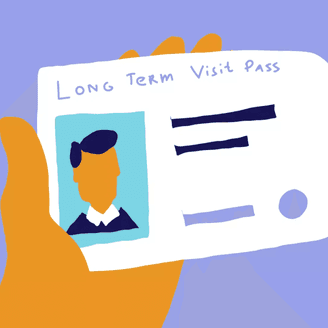
Melissa Yeo
Business Writer
Melissa's unique storytelling expertise makes a difference for small business owners and entrepreneurs. Her background in content and social media spans eight years in various industries, including publishing, e-commerce and marketing. At Osome, she makes everything about running a business less intimidating. From specific accounting and bookkeeping advice to insights for company growth, Melissa's articles help you to take the next step on your entrepreneurship journey.
If you're a foreign national but wish to stay in Singapore for over 30 days, you will have to obtain a Long Term Visit Pass (LVTP).
With an LTVP, you can stay in Singapore for a period of up to two years, and the pass can be renewed for subsequent periods. The LTVP is different from other types of visas in Singapore, such as the Employment Pass, which is issued to foreign professionals, managers, and executives who are employed by Singapore companies; or the Student Pass, which is issued to foreign students who wish to study in Singapore.
In a nutshell, the LTVP Singapore is specifically designed for those who wish to stay in Singapore for a longer period of time without having to apply for a new visa every few months.
Read on for our comprehensive guide on everything you need to know about LVTP, including its eligibility, conditions, application process, and requirements. If you require assistance to start your business journey in Singapore and apply for the Employment Pass, please don’t hesitate to contact us !
What Is a Long Term Visit Pass in Singapore?
According to the Ministry of Manpower (MOM), a Long Term Visit Pass (LTVP) in Singapore is a type of visa issued to foreigners who wish to stay in Singapore for an extended period of time to visit their family members who are Singapore citizens or permanent residents, or for other long-term purposes such as employment, business, or study.
The Long-Term Visit Pass is meant for a common-law partner, step-child, or handicapped child of an Employment Pass or S Pass holder. Pass holders who earn over S$12,000 can also get a pass for their parents.
To apply for a LTVP, the applicant must be sponsored by a Singapore citizen or permanent resident who is either a spouse, parent, child or grandchild. The sponsor must also meet certain eligibility criteria, such as income and housing requirements. The application process for the LTVP can be done online or at a Singapore embassy or consulate overseas, and typically takes several weeks to process.
What Is LTVP+?
Also known as the Singapore Long Term Visit Pass Plus, the LTVP+ allows holders to stay in Singapore for three years, and can be subsequently renewed for up to five years per renewal. This is applicable to spouses of Singaporean citizens or Permanent Residents. Additionally, LTVP+ holders can enjoy health and employment benefits.
Nonetheless, LTVP+’s eligibility conditions include having at least one child who is Singaporean. If you do not have a child, you could still be eligible if you have been married for at least three years.
Types of Long Term Visit Pass
There are two types of LTVP available in Singapore – namely the ones issued by the Singapore Immigrant and Checkpoints Authority (ICA), and the MOM.
1st Type: Issued by the ICA
The ICA issues one type of LTVP. This LTVP functions like an extension of an existing Short-Term Visit Pass. This is applicable to foreign visitors who wish to stay in Singapore for over 30 days that the Short-Term Visit Pass permits .
2nd Type: Issued by the MOM
Another type of LTVP is issued by the MOM. This is applicable to the family members of foreign employees who are not eligible for the Dependant’s Pass , but wish to live with their family members in Singapore.
Who Is Eligible To Apply for a Long Term Visit Pass in Singapore?
Depending on the type of LTVP you intend to apply, the eligibility criteria differs.
According to the ICA , you can apply for a LTVP with them if you fulfill the following conditions:
- Spouse of a Singaporean citizen;
- Spouse of a Singapore Permanent Resident;
- The dependant child (below age 21) of a Singaporean Citizen or Permanent Resident;
- The parent of a Singaporean Citizen or Permanent Resident;
- Graduate from a Higher Learning institution who wishes to be employed in Singapore;
- The mother or grandmother of a young foreigner who is studying in Singapore with a Student’s Pass;
- Foreigner seeking permission to give birth in Singapore.
If you are a foreign employee and wish to bring your family member to Singapore with an LTVP, you can do so if:
- You hold a Singapore Employment Pass (EP) or S Pass
- Earn a fixed monthly income of S$6,000 based on your own income, and not the combined household income
- Your employer is a Singapore-registered, established company
- You hold a Singapore EntrePass
If you meet the above criteria, you can obtain a pass for your:
- Common-law spouse
- Unmarried step-children under 21 years old
- Unmarried handicapped children 21 years old and above
- Parents – if you earn a fixed monthly income of at least S$12,000
The Required Documents for a Long Term Visit Pass

To apply for your LTVP, your documents have to be in English and in their original copies. If they are not in English, the documents will have to be translated by a professional translator.
Documents for the ICA
To apply for your LTVP at the ICA, you will need:
- A photocopy of your passport bio-data page;
- Disembarkation/Embarkation (D/E) number;
- Recent passport-sized photo taken within the last three months, based on Singapore’s acceptable photo guidelines .
Additional required documents depending on the person travelling:
Common-law spouses
- Marriage certificate
- Document reflecting the highest level of education of both spouses
- Divorce certificate, for either partner, in the event that one of you has had a past divorce
- Letter of Long-Term Visit Pass Eligibility (LLE) (If applicable)
Parent of Singaporean Citizen or Permanent Resident
- Child’s birth certificate
- Adoption papers (if applicable)
Dependant child
- Parent’s divorce or custody documents (if applicable)
Mother or grandmother of Student Pass holder
- Divorce certificate or custody documents (if applicable)
- The student’s Pass Card
- The Student Pass holder’s passport
- Child’s birth certificate (for mother)
- Child’s birth certificate and birth certificates of parents (for grandmother)
Foreign graduate looking for employment in Singapore
- Certificate with highest level of academic achievement
Foreign visitor looking to give birth in Singapore
- Letter from local doctor stating the mother’s due date and if there are any complications
- Letter from the mother’s embassy or high commissioning, stating that the child will inherit the mother’s nationality, and a valid passport
Documents required from the Singaporean Citizen or Permanent Resident:
- Identity Card;
- Past three years of income tax Notice of Assessment;
- Central Provident Fund (CPF) Statement for the past 12 months which reflects his/her monthly CPF contributions;
- Employment letter, reflecting the start date, position, and monthly income;
For self-employed individuals:
- Valid registration certificate issued by the Accounting and Corporate Regulatory Authority (ACRA);
- Past 12 months of the company’s Profit and Loss Statement.
Documents for the MOM
To apply for the LTVP at the MOM , you can refer to the following information:
Required documents for common-law spouses: <br>
One of the following:
- A photocopy of your common law certificate
- A notarised affidavit from you confirming that you and your spouse are in a common-law relationship under your home country’s laws
- Letter from the embassy which confirmed that you and your partner are considered to be in a common-law relationship under their law
Required documents for a dependant child over the age of 21:
- Report or letter from a doctor regarding the child’s condition
Required documents for step-children under the age of 21:
- Copy from the court regarding child’s custody
- Verification of Vaccination Requirements issued from the Health Promotion Board if your child is under the age of 12
- Letter confirming the other parent does not disapprove of the child coming to Singapore
Required documents for parents:
- Your birth certificate which reflects the names of your parents

Can You Renew Your Singapore Long Term Visit Pass?
You can renew your Long Term Visit Pass Singapore, following the same process as your initial application.
- To renew your LTVP issued by the ICA, you will have to apply at least ten days before your current one expires.
- To renew your LTVP issued by the MOM, you will have to apply a maximum of six months before your current one expires.
However, renewing your LTVP renewal does not necessarily guarantee that you will obtain your new pass, since you will be assessed based on your eligibility and the existing criteria.
Differences Between LTVP, Employment Pass and S Pass
LTVP, Employment Pass and S Pass are all different types of work visas that allow foreigners to work and live in Singapore. However, they vary in terms of eligibility requirements, benefits, and validity period.
The LTVP is a long-term visit pass issued to foreigners who are married to Singaporean citizens or permanent residents, or who have children who are Singapore citizens or permanent residents. It allows them to stay in Singapore for extended periods of time of up to 2 years initially, and is renewable subsequently. However, it does not allow the pass holder to work in Singapore.
The Employment Pass is a work visa for foreign professionals, managers, executives, and skilled workers who are hired by a Singapore-registered company. To qualify for an Employment Pass, the applicant must have a job offer from a Singapore-based company, earn a monthly income of at least S$4,500, and possess relevant educational qualifications and work experience. The validity period of an Employment Pass is usually between 1 to 2 years, depending on the applicant's qualifications and the sponsoring company.
An S Pass is a work visa for mid-level skilled foreign employees. To qualify for an S Pass, the applicant must have a job offer from a Singapore-based company, earn a monthly minimum income of S$2,500, and have relevant qualifications and work experience. The validity period of an S Pass is usually between 1 to 2 years, depending on the applicant's qualifications and the sponsoring company.
In summary, an LTVP allows foreigners to stay in Singapore for an extended period of time, but does not allow them to work. On the other hand, an Employment Pass is meant for high-level skilled foreign professionals and managers, while an S Pass is for
mid-level skilled foreign employees. Both Employment Pass and S Pass holders are allowed to work in Singapore, with Employment Pass holders enjoying more benefits – including the ability to bring their families over and to apply for permanent residency.
Differences Between LTVP and Dependant Pass
LTVP and Dependant’s Pass are both visas issued by the Singapore government to the family members of foreigners who are living and working in Singapore. While they share some similarities, there are also some key differences between the two:
1 Eligibility Requirements
A Dependant Pass is issued to the legally married spouse or unmarried children (under the age of 21) of an Employment Pass or S Pass holder, while a Long-Term Visit Pass is issued to a wider range of family members, including the legally married spouse or unmarried children (under 21 years old) of a Singapore citizen, permanent resident or Employment Pass holder. The LTVP is also issued to other family members such as parents, step-parents, and handicapped children who are over 21 years old.
2 Employment
Dependant’s Pass holders can work in Singapore, but only if they secure their own work visa. On the other hand, LTVP holders are not allowed to work in Singapore.
Dependant’s Pass holders enjoy similar benefits as their main pass holder in terms of healthcare, education and access to housing. They can also apply for permanent residency. However, LTVP holders are not entitled to the same benefits as Dependant’s Pass holders, but they are eligible to stay in Singapore for a longer period of time and have more flexibility in terms of their stay in the country.
4 Validity Period
A Dependant’s Pass is usually valid for the same duration as the main pass holder's work visa. For instance, if the main pass holder has an Employment Pass that is valid for 2 years, the Dependant’s Pass will also be valid for 2 years. In comparison, an LTVP can be issued for up to 2 years initially, and is renewable thereafter.
In summary , the main difference between LTVP and Dependant’s Pass lies in the eligibility requirements, validity period and employment opportunities. Dependant’s Pass is only available for family members of Employment Pass or S Pass holders while LTVP is available for a wider range of family members, and Dependant’s Pass holders can work with a separate work visa, while LTVP holders are not allowed to work in Singapore.
The Required Steps of Applying for the Long Term Visit Pass

Gather the required documents and complete the application form . Upon submission of your application, you can expect a notification from the MOM.
Once you have successfully completed this step, you will obtain the in-principle letter of approval. Afterwards, you should bring your family members over. When you are all in Singapore, you will have to obtain a pass issued for your family members.
How to apply for a long term visit pass:
Pre-approved Letter of Consent (PLOC)
The Pre-approved Letter of Consent (PLOC) is a document introduced by the MOM, and allows the holder to work in Singapore legally.
The PLOC does not require you to have a job offer secured, yet remains effective so long as your LTVP or LVTP+ remain valid. This means that in the event that your LTVP or LTVP+ expires, your PLOC also becomes invalid.
To be eligible for a PLOC application, you are required to have a spouse or unmarried child of a Singaporean citizen or permanent resident. Otherwise, you can also have an LTVP or LTVP+ to be eligible for the application. If you are unable to apply for a PLOC but wish to work in Singapore, you will have to apply for a Letter of Consent through your company.
Letter of Consent (LOC)
Unlike the PLOC, the Letter of Consent (LOC) requires you to have secured a job offer prior to applying. Granted by the MOM, this letter provides you the right to legally work for a Singapore-registered business. There is no limit to the number of employees a Singapore-registered business can employ, which makes LOC holders appealing employment prospects.
To be eligible for a LOC, you will need to have a Dependant’s Pass that is tied to an Employment Pass holder, EntrePass, or be a holder of a Personalized Employment Pass (PEP) that is valid for a minimum of 3 months from the application date.
Alternatively, you can also possess a LTVP that is tied to a Singaporean Citizen or Permanent Resident, that is valid for a minimum of 3 months.
Employment Pass
Holders of the LTVP and Dependant’s Pass can also apply for the Employment Pass, other than their family member with the main work permit.
With an Employment Pass, there is more flexibility – in fact, the pass holder can even hold directorial roles in a Singapore-registered business.
Holders of the LTVP and Dependant’s Pass with an Employment Pass can also freely renew and cancel the pass, without being affected by the main family member.
Find out more about Singapore PR renewal criteria .
To Round Off
In conclusion, the Long-Term Visit Pass (LTVP) in Singapore is an important visa option for family members of Singaporean citizens, Permanent Residents, or work visa holders who want to stay in the country for an extended period of time. The LTVP allows family members to stay in Singapore for up to two years initially, with the possibility of renewal.
Although LTVP holders are not permitted to work in Singapore, they can enjoy the country's high standard of living, healthcare, education, and other benefits. The application process for the LTVP involves determining eligibility, submitting an online application, paying a fee, undergoing a medical examination, and collecting the LTVP.
How Much Does the Application Cost?
There is a non-refundable application fee of S$30 for each submitted application. Payment can be done online using a credit card.
Once your LTVP is approved, you are required to pay S$60 for the pass itself. Additionally, you may also have to pay for other applicable fees depending on your situation.
What Does the Application Process Look Like?
The application process is relatively easy. Simply gather the necessary documents, complete the application, and submit them. In a few weeks’ time, you will either receive a notification about your acceptance or rejection. If your application is approved, you will obtain the in-principle approval letter. Subsequently, bring your sponsored family member over to Singapore, and have their pass issued with the authority.
Can I Extend or Cancel My Application?
To extend your LTVP, you will have to repeat the same process as your initial LTVP application. However, this does not necessarily guarantee that you will obtain your new pass, since you will be assessed based on your eligibility and the existing criteria.
To cancel your LTVP, log onto the Employment Pass Online portal and hover over to the LTVP section. You can then cancel your LTVP in just a few clicks. If you’re the person cancelling the LTVP, it will be immediately cancelled. If your employer is cancelling your visa, it could take some time for your LTVP to be cancelled.
In the event that your family member no longer requires the LTVP, you have to cancel it and return the card to the issuing authority. This cancellation is immediate and does not incur any fees.
How Long Is the Long Term Visit Pass Valid for?
The LTVP has a validity of up to two years, depending on your reason of application. If you wish to join a family member who is a foreign employee in Singapore, your Pass will have the same validity period as their Employment Pass.

- Table of contents
- Share this post
- Scroll to top
Get expert tips and business insights
Advice on starting and growing your company, as told by Osome's business community

Fresh insights from our business blog
Understanding singapore’s foreign worker quota and how it works.
If you're a foreign worker in Singapore, the chances are that you've encountered or heard about the foreign worker quota. It's something that employers in Singapore have to adhere to when hiring foreign labour.

How To Renew Your Work Permit in Singapore
If you wish to employ foreign workers for your company, you will have to obtain a Work Permit on their behalf. There are several types of work permits available, depending on the nature of the work and the qualifications of the applicant. When your employees’ Work Permit expires, you will have to renew it for them so that they can continue working in the country.

How To Cancel Your Work Permit in Singapore
In Singapore, Work Permit cancellation is an important process that foreign workers or Singapore expats have to go through. In a nutshell, you are required to cancel a Work Permit when you are no longer in your existing employment, or when the Work Permit expires. Once the Work Permit has been cancelled, you will have to cut the Work Permit in half, and discard it so that it will not be misused.
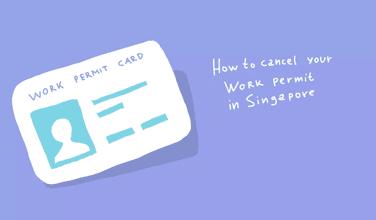
- go to page 1
- go to page 2
- go to page 3
Get business confidence
Tips on starting and growing your company, as told by Osome’s business community
We’re using cookies! What does it mean?
Header Top Bar
InCorp Global
- Business Blogs
A Complete Guide on Long Term Visit Pass (LTVP) Singapore
- Our Leadership
- Partners & Accreditations
- Life at InCorp Global
- Hong Kong SAR
- Mainland China
- Philippines
- Infographics
- Client Stories
- Press Releases
- All Categories Business Blogs CSR eBooks for Business Events Infographics Life at InCorp Global New Podcast Series Press Releases Pro Business Podcast Season 1 Pro Business Podcast Season 2
- Business Set Up
- Fund Structuring
- Immigration
- Risk Assurance
- Sustainability
- Trademark Registration
Search Business Blogs
Select topic.

InCorp Content Team
- 1 Jul, 2024
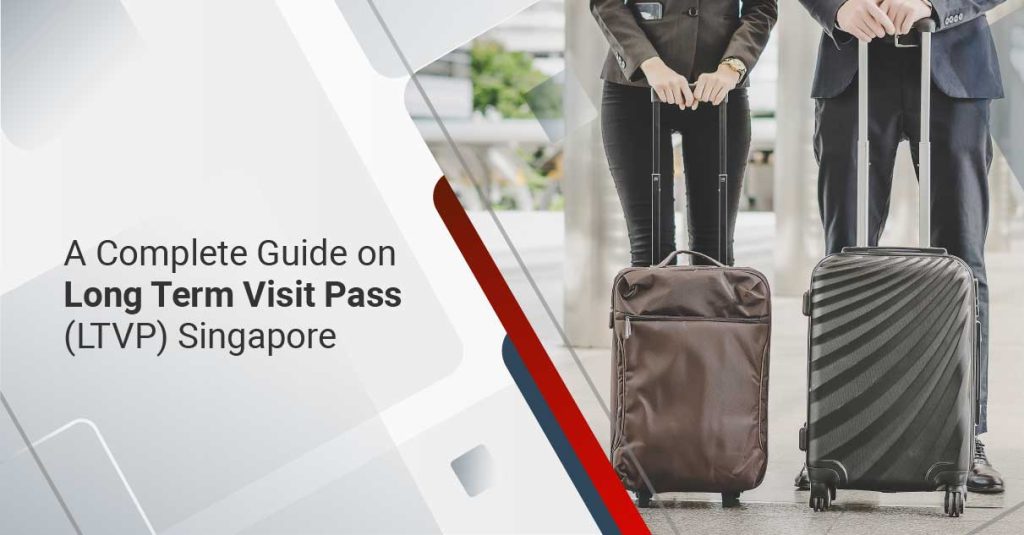
What is the Long Term Visit Pass (LTVP)?
Who can apply for a long-term visit pass, common-law spouse, unmarried handicapped children (aged 21 and above), unmarried step-children (below 21 years), renewing, extending, and canceling ltvps, can a long-term visit pass holder work in singapore.

The Long-Term Visit Pass (LTVP) is designed for people who wish to stay in Singapore longer to be with their family members. To be eligible for the LTVP, applicants must be one of these:
- An unmarried child under 21 years old
- A handicapped child above 21 years old of a Singapore Citizen or Permanent Resident
The application process involves submitting the necessary documents, such as a completed application form, a passport-sized photograph, and proof of relationship with the sponsor (e.g., marriage certificate or birth certificate).
Once the application is submitted, the processing time can take several weeks. Upon approval, the applicants can collect their passes from the Immigration and Checkpoints Authority (ICA) office.

You can apply for a Long Term Visit Pass for your family, provided you satisfy all the required eligible conditions , including
- You must be a Singapore Employment Pass, EntrePass , Personalized Employment Pass (PEP), or S Pass holder.
- Earn a minimum fixed monthly salary of S$6,000, based on your salary and not based on your combined household income.
- If you have sponsorship from a registered Singapore company
Additionally, the following family members are eligible for a pass:
- Common-law spouse
- Handicapped unmarried children aged 21 and above
- Unmarried step-children under 21 years old
- Parents if they have a fixed monthly salary of at least S$12,000
Types of LongTerm Visit Pass (LTVP) in Singapore
There are two types of Long-Term Visit Passes available in Singapore. It includes LTVP and LTVP+. The main difference between these two passes is as follows.
The Immigration and Checkpoints Authority (ICA) is the issuing authority for the LTVP. It is designated for the unmarried, legally married, or adopted children of Singaporeans or permanent residents. The LTVP grants a residency duration of up to two years.
The Ministry of Manpower (MOM) is responsible for issuing this pass in Singapore. The LTVP+ is available to certain LTVP holders who have been residing in Singapore for an extended period and wish to seek employment. It offers a longer residency duration of up to three years.
Documents Required for Long-Term Visit Pass

The individual has to submit necessary documents such as copies of passport details and birth or marriage certificates. Apart from these, you may also need to submit additional documents depending on the family member you are applying to.
- Copy of marriage certificate
- An affidavit by the work pass holder and their spouse. It should be declared that they are in a common-law relationship recognised under the laws of their home country/region.
- An acknowledgment letter from the region/home country/ embassy of the work pass holder or spouse
- A letter from medical practitioners considering the child’s physical conditions.
- The court order copy on the child’s custody
- An acknowledgment letter from the other biological parent stating there is no objection to bringing the child to Singapore
- Documents related to Vaccination Requirements (for entry to Singapore), issued by HPB
- The work pass holder’s birth certificate states the names of the parents
To renew the Long Term Visit Pass , the individual has to apply online at least six weeks before the pass expires. The processing time is typically within six weeks. The sponsor or the pass holder can apply.
Extending an LTVP is not guaranteed, and the decision is based on various factors. To extend the pass, the sponsor can apply online at least six weeks before the pass expires. The processing time is within six weeks.
To cancel an LTVP, the sponsor should submit a cancellation request online. Once the pass is cancelled, the pass holder will need to leave Singapore within 30 days.
The Long Term Visit Pass (LTVP) allows eligible individuals to live and work in Singapore for an extended period. However, it is important to note that the LTVP is not intended for employment purposes. Instead, it is designed for the spouses and unmarried children of Employment Pass or S Pass holders, as well as common-law spouses and step-children of Singapore citizens and permanent residents.
If you are an LTVP holder who wishes to seek employment in Singapore, you may be eligible for the LTVP-Plus. This pass is available to certain LTVP holders who have been residing in Singapore for an extended period. Eligible candidates include spouses, unmarried children of Employment Pass or S Pass holders, and parents of Singapore citizens.
What is the approval rate of the Long-Term Visit Pass (LTVP)?
- The applicant lacked local family ties.
- Either the sponsor or applicant had unfavourable records.
- The sponsor couldn't exhibit the financial capability to support both themselves and the applicant.
I have an LTVP. Can I work in Singapore?
- When applying for or renewing your LTVP or LTVP+ with ICA, you can apply for a Pre-approved Letter of Consent (PLOC). This letter enables LTVP or LTVP+ holders to work in Singapore without the requirement of securing a job beforehand.
How much do I have to pay for an LTVP in Singapore?
- A fee of S$105 must be initially paid via a valid card, followed by waiting for the LTVP processing. Upon approval, an additional S$225 is required for the Singapore Long Term Visit Pass LTVP itself. Please be aware that other fees may be applicable depending on your specific situation.
About the Author

More on Business Blogs
How can we help you.
We deliver expert advice across a variety of corporate services.
Contact InCorp Global HQ
30 Cecil Street, #19-08 Prudential Tower, Singapore 049712
Call us +65 6990 8220 WhatsApp +65 8699 8821
Stay Up-to-Date With Our Newsletter
- Full Name *
- Email Address *
- I have read InCorp's Privacy Policy and agree to InCorp using my information provided to contact me about related content, and services. *
- Name This field is for validation purposes and should be left unchanged.

- Partners & Accreditations
- Business Guides
- APAC Presence
- Get A Quote Now
Home » Blog » Immigration » Types of Work Passes in Singapore, and How to Get Them
Types of Work Passes in Singapore, and How to Get Them
- June 7, 2023
- Lanturn Content Team
- Immigration

Start the journey
Speak with one of our experts to explore a tailored solution for your business
There are many different types of work pass in Singapore or work permits, and if you are looking to hire and retain the best staff, it helps to understand the options:

Work Pass in Singapore – Employment Pass (EP)
This is the most common type of valid work visa or work pass issued to skilled foreign workers in Singapore, and these are its key characteristics:
- It’s initially valid for one or two years at the discretion of the Ministry of Manpower (MOM), which issues all work-related visas in Singapore.
- Companies apply for EPs for specific employees, and they are not portable. If your employee quits, to take another job in Singapore, their EP with you is terminated, and their new employer has to secure a new EP for them.
- EPs can be renewed multiple times, for up to 3 years at a time. Again, the extended validity is subject to the discretion of the MOM.
- EP holders sponsor their spouse and children for a Dependent Pass.
If you are looking to apply for a work pass in Singapore for a foreign employee, here is a checklist of the conditions that must be met:
- You must offer your prospective employee a fixed monthly salary of at least $5,000 per month.
- Your prospective employee’s employment history must be relevant to the job you offered them
- Your prospective employee must have the necessary educational qualifications from a recognised university. As part of their EP work pass application, you will need to submit copies of their degree certificate and their course transcripts
Starting in September 2023, Singapore work pass applicants will have to meet a new minimum requirement to be eligible, as the Ministry of Manpower has introduced a new point-based system called the Complementarity Assessment Framework (COMPASS). Read our article on COMPASS and discover how it can affect your work pass application .
Ready for the next step in your career? Secure your Employment Pass with Lanturn!
Work Pass in Singapore – EntrePass
Harder to get than an EP, the Entre-pass is aimed at serial entrepreneurs, high-calibre innovators or experienced investors who want to operate a business in Singapore that is venture-backed or owns innovative technologies. It is relevant if you:
- Work at a venture capital (VC) firm
- Are enlisted in a recognised incubator program for startups
- Is an investor planning to invest in companies in Singapore
Key characteristics of an Entre-pass:
- It can be applied before or after the company is registered in Singapore.
- It is initially valid for one year.
- Furthermore, it can be renewed for two years as long as the holder remains employed. Subsequent renewals will include a minimum business spending and local hiring quota.
- Passes are available for their family as long as the company reaches the minimum spending and local hiring quota.
Ensure a smooth work pass application for an Entre-pass by ticking off these important boxes:
- The EntrePass applicant must own more than 30% of the company they plan to work at.
- The applicant is planning to set up a private limited company in Singapore, or they’re planning to work in a new company that was set up within the last six months.
If you are looking to start your own business, you could be eligible for an EntrePass, if you fulfil the criteria. Get in touch with us and take the first step to building your business in Singapore.
Work Pass in Singapore – S-Pass
Even harder to get than an EntrePass, the S-Pass is designed for younger foreign workers with strong technical skills. Strict quotas apply, should your company need to apply for an S-pass for your employees. The employer will also need to pay a levy to the Ministry of Manpower for all their S-Pass holders. No more than 18% of its workforce (in the construction, manufacturing, marine shipyard and process sectors) can be S-Pass holders; 10% if you are in the service industry.
Key characteristics of an S-Pass:
- It is initially valid for up to two years.
- It is renewable for up to three years.
Applying for a work pass in Singapore? Here are some key things to keep in mind when aiming for an S-pass:
- Your prospective employee must be offered a monthly salary of at least $3,000 or $3,500 if you are in the financial sector. [Note: This will increase to $3,150 per month (or $3,650 per month in the financial sector) starting 1 September 2024.]
- They must have an employment history that is relevant to their role.
- They must have a recognised diploma, and they must submit copies of their certificates and course transcripts for their work pass application.
- You must provide your prospective employee with medical insurance worth at least $15,000 per year. [Note: Starting from July 1, 2023, employer co-payment will apply to claim amounts above the initial $15,000, and an increased annual claim limit of $60,000 will be implemented for policies moving forward.]
Pass for Family in Singapore – Dependents Pass (DP)
A DP is designed for Singapore-based family members of an EP (employment pass), S-Pass or Entre-pass holder.
Key characteristics of a DP:
- Common-law spouse
- Unmarried stepchildren (under 21 years of age)
- Unmarried handicapped children above 21 years of age
- Parents – only for those earning a fixed monthly salary of at least $12,000.
- Here are the requirements to get an LTVP:
- You have to meet one of the conditions above.
- The EP or S-pass holder must have a fixed monthly salary of at least $6000.
Work Pass in Singapore – Tech.Pass
The Tech.Pass is a visa administered by the Singapore Economic Development Board, that allows established tech entrepreneurs, leaders or technical experts from around the world to come to Singapore to perform frontier and disruptive innovations.
Key characteristics of a Tech.Pass:
- It can be renewed for two years as long as the holder remains employed. Subsequent renewals require the Tech.Pass holder to be in a certain role; as well as reach a minimum salary criteria or minimum business spending and local hiring quota.
- The Tech.Pass holders can start and operate one or more tech companies, work for multiple companies, and be on the board of directors for one or more Singapore-based companies.
Before submitting your work pass application in Singapore, ensure you meet the essential Tech.Pass criteria:
Meet any two of the following conditions:
- Have a last drawn fixed monthly salary (in the last 1 year) of at least S$20,000.
- Have at least five cumulative years of experience in a leading role in a tech company with a valuation/market cap of at least US$500mil or at least US$30mil funding raised.
- At least five cumulative years of experience in a leading role in the development of a tech product that has at least 100,000 monthly active users or at least US$100mil annual revenue.
ONE Pass (Overseas Networks & Expertise)
Last January 2023, the MOM launched a new customised work pass in Singapore for talented individuals in the field of:
- Arts and Culture
- Research and Academia
The ONE Pass is available to individuals of any nationality, whether they are existing pass holders or from overseas, as long as they can meet the qualification criteria. The pass allows its holders to have the freedom to work for several companies at once or have their startup while being a shareholder. Read our informative article on ONE Pass and its requirements to learn all the details about how to obtain this new personalised work pass in Singapore.
Streamline Your Visa and Immigration Process with Lanturn
Navigating the complexities of work passes and visas in Singapore can be challenging. At Lanturn , we specialize in providing comprehensive corporate services, including expert guidance on work pass applications and compliance. We stay updated with the latest regulations from the Ministry of Manpower (MOM) to ensure a smooth and hassle-free experience.
Discover how our tailored solutions can simplify your visa and immigration journey.
Contact us today for a personalised consultation on the best work pass for you.
- Tied to the Main Work Pass holder. Should the Main Pass be cancelled, the DP will also be cancelled.
- DP can be applied for children of Work Pass holders who meet the criteria, allowing them to study in Singapore without a student visa.
Here is a list of some of the key boxes you need to tick to get a DP:
- You have to be the spouse of the EP, S-Pass or EntrePass holder.
- For children of the EP, S-Pass or Entre-pass holder, they must be under 21 years of age
- The EP or S-pass holder must have a fixed monthly salary of at least $6000. Planning to unlock new opportunities for your family? Secure your Dependant Pass with Lanturn, today!
Pass for Family in Singapore – Long-Term Visit Pass (LTVP)
Alternatively, an EP or S-Pass holder can apply for a Long-Term Visit Pass for their:
- No Comments
- https://www.facebook.com/
- https://x.com/
Share This Post
Leave a reply cancel reply.
Your email address will not be published. Required fields are marked *
Save my name, email, and website in this browser for the next time I comment.
Prefer us to email you?
Leave us your contact we we will be in touch..
All fields are mandatory
Keep reading

Understanding Foreign Account Tax Compliance Act (FATCA) and CRS in Singapore
Reading time 7 minutes In 2014, Singapore adopted the Foreign Account Tax Compliance Act (FATCA) regime after signing a Model 1 Intergovernmental Agreement (IGA) with the

Regulatory Compliance for Background Screening in Singapore
Reading time 13 minutes In Collaboration with Veremark Singapore’s thriving economy attracts numerous international professionals annually. Positioned as the financial hub of Asia, Singapore has successfully

Navigating Singapore’s 2024 GST Rate Change
Reading time 9 minutes Another change has come in Singapore’s fiscal landscape with the upcoming implementation of the 2024 Goods and Services Tax (GST) rate change.
Enter a text to search
- Media Release Detail
New Long-Term Visit Pass Scheme (LTVP+)
From 1 April 2012, the Government will introduce a new scheme to help Singaporean families with foreign spouses. This new scheme, known as the Long-Term Visit Pass-Plus (or LTVP+), will provide foreign spouses of Singapore citizens who qualify, with greater certainty of stay here by granting the holder a longer period of residency. LTVP+ holders will also be eligible for healthcare and employment benefits.
2. Couples who have at least one Singaporean child from their marriage will be eligible to apply for the LTVP+. For those without a Singapore Citizen child, ICA will look at other factors such as the duration of marriage, and will in general consider more favourably those who have been married for at least three years.
3. LTVP+ holders will be eligible for a longer period of residency in Singapore. The LTVP+ will be for a duration of three years in the first instance and will be for up to five years for each subsequent renewal. LTVP+ holders will enjoy healthcare subsidies for inpatient services at restructured hospitals, which will currently be set at a level close to that for Permanent Residents. In addition, we will make it easier for LTVP+ holders to seek work here. Their prospective employer will apply to the Ministry of Manpower (MOM) for a Letter of Consent (LOC), instead of an Employment/S Pass or Work Permit, for them. LTVP+ holders who are issued with LOCs will not be counted against the foreign worker quota of their employers. Their employers are also not required to pay foreign workers’ levy for them.
4. The new LTVP+ scheme seeks to provide more assistance to Singapore families with foreign spouses. The number of marriages between Singapore citizens and foreigners has been on an increasing trend. In 2010, among the 20,273 marriages involving at least one Singapore citizen, 30 per cent were between a Singapore citizen and a foreigner (excluding Permanent Residents). This is an increase from 23 per cent in 2000.
5. Foreign spouses can continue to apply for Singapore Citizenship or Permanent Residence (PR) status. They will be granted SC or PR if they meet the respective criteria. Those who are not yet eligible for SC or PR can apply for LTVP. With effect from 1 April 2012, they can also apply for an LTVP+ status which comes with more benefits.
6. For more information on the LTVP+ scheme, please visit the ICA website at www.ica.gov.sg . You can also email ICA at: [email protected] .
LONG-TERM VISIT PASS - PLUS (LTVP+)
FREQUENTLY ASKED QUESTIONS
(A) LTVP+ Application
Q1: Why is the Long-Term Visit Pass - Plus (LTVP+) being introduced?
A1: The number of marriages between Singapore Citizens (SC) and foreigners has been on an increasing trend since 2000. In 2010, 30 per cent of 20,273 marriages involving at least one SC were between a SC and a foreigner (excluding Permanent Residents). This is up from 23 per cent in 2000.
The LTVP+ is introduced to help SC families with foreign spouses. It provides foreign spouses of SCs who qualify, greater certainty of stay by allowing the holder a longer period of residency. LTVP+ holders will also enjoy healthcare and employment benefits. The LTVP+ will be implemented on 1 April 2012.
Q2: Who is eligible for the LTVP+? Do all foreign spouses of Singapore citizens qualify for LTVP+?
A2: Couples who have at least one child who is a Singapore Citizen from their marriage will be eligible to apply for the LTVP+. For those without an SC child, we will look at other factors such as duration of marriage, and will in general consider more favourably those who have been married for at least three years. Each application will be considered on its own merits. Other factors that we consider include the ability of the sponsor to financially support the family, and good conduct of both the sponsor and the applicant.
Q3: What is the difference between LTVP and LTVP+ in terms of benefits?
A3: Both LTVP and LTVP+ allow the holder to have long-term stay in Singapore. The LTVP+ has a longer period of residency and comes with additional employment benefits and healthcare subsidies.
Q4: What benefits does the LTVP+ entail?
A4: LTVP+ comes with a longer validity, three years in the first instance and up to five years for subsequent renewals. LTVP+ holders will also enjoy employment benefits and be accorded healthcare subsidies for inpatient services at the Restructured Hospitals. These subsidies for in-patient healthcare services will currently be set at a level close to that for Permanent Residents.
Q5: How do I go about submitting the application for LTVP+?
A5: There is no separate application for LTVP+. Foreign spouses of SCs who submit applications for LTVP would automatically be considered for LTVP+ if they are eligible. For information on how to apply for LTVP/LTVP+, please refer to the ICA website at www.ica.gov.sg
Q6: My foreign spouse is currently on LTVP. Will she be given LTVP+ automatically or upgraded to LTVP+ if she qualifies?
A6: If your spouse is currently holding LTVP and meets the eligibility criteria for LTVP+, she will be considered for LTVP+ upon her next LTVP renewal. However, if your spouse wishes to be considered for a LTVP+ before the next renewal, she may submit a fresh application for consideration. The relevant processing fee and issuance fee (if applicable) would apply.
Q7: I have just submitted my application for LTVP for my spouse before this announcement. Do I have to re-submit an application for LTVP+? Or will my spouse be automatically considered for LTVP+?
A7: Applications submitted from 1 Feb 2012 would be automatically considered for LTVP+.
Q8: My foreign spouse is currently pregnant. Is she eligible to apply for LTVP+?
A8: Yes. She is eligible to apply for LTVP+.
Q9: If my foreign spouse is unable to get a LTVP+, can he/she continue to stay in Singapore?
A9: All foreigners must have a valid pass to remain in Singapore. The foreign spouse of a Singapore Citizen who is not eligible for the LTVP+ may be considered for the LTVP which allows the spouse to stay in Singapore.
Q10: Can I sponsor my parents or in-laws for LTVP+? How about my children?
A10: No. Parents, Parents-in-law or children are not eligible for LTVP+. The LTVP+ is only for spouses of Singapore Citizens.
Q11: What is the validity period for the LTVP+?
A11: LTVP+ holders can enjoy a period of residency of three years in the first instance, and up to five years for each subsequent renewal.
Q12: Is there any cost involved for the LTVP+ card? Is the LTVP+ card more expensive than the normal LTVP card?
A12: There is an application fee of $30. If your application for LTVP+ is successful, you will need to pay $60 for the LTVP+ card and an additional $30 if a visa is required. This is the same as the current fees for LTVP.
Q13: What is the processing time for the LTVP+ application?
A13: Generally, it takes up to six weeks to process an LTVP+ application.
Q14: How do I check the status of my application for LTVP+?
A14: You may check the status of your application for LTVP+ using iEnquiry ( https://ienquiry.ica.gov.sg ).
Q15: My foreign spouse and I registered our marriage overseas and our marriage certificate is issued by the foreign authority. Is our marriage certificate recognised for my spouse’s application for LTVP+?
A15: Yes, the marriage certificate issued by an authorised foreign body is recognised for your foreign spouse’s application for LTVP+.
Q16: My foreign spouse and I have undergone a customary marriage overseas three years ago. Is our marital status recognised for my spouse’s application for LTVP+?
A16: So long as you are able to show proof that your marriage is recognised in the foreign country where you had undergone your customary marriage, ICA will consider the application.
Q17: I am a foreign widow of a Singaporean and have a young Singaporean child. Am I eligible to apply for LTVP+?
A17: Yes, you are eligible to apply for LTVP+.
Q18: I am the foreign spouse of a Singaporean. I have been married for three years and have a Singaporean child from the marriage. What other criteria must I or my Singaporean spouse satisfy before I can be granted a LTVP+?
A18: Other factors that we consider include the ability of the sponsor to financially support the family, and good conduct of both the sponsor and the applicant.
Q19: Is the LTVP+ a pre-requisite for getting Singapore Permanent Residence (SPR)? A19: LTVP+ is not a pre-requisite for the application of Singapore Permanent Residence (SPR).
Q20: I am a PR in Singapore. Is my foreign wife eligible to apply for LTVP+?
A20: No. The privilege of sponsoring a foreign spouse for LTVP+ is only applicable to Singapore citizens.
Q21: My child is born overseas and is currently on a Visit Pass/ Student Pass. Is my foreign spouse eligible for LTVP+?
A21: Couples who have at least one child who is a Singapore Citizen from their marriage will be eligible to apply for the LTVP+. For those without an SC child, we will look at other factors such as duration of marriage, and will in general consider more favourably those who have been married for at least three years.
Q22: I am the foreign spouse of a Singapore citizen and I am holding a valid work pass at the moment. I wish to apply for the LTVP+. How do I do so?
A22: Foreign spouses of Singapore citizens who are on valid work passes and want to be considered for an LTVP+ should submit their applications over the counter at the Visitor Services Centre, 4th floor, ICA Building. For information on LTVP+ application , please visit www.ica.gov.sg or email ICA at : [email protected] .
(B) Employment Benefits
Q23: I am an LTVP+ holder. What is the appropriate work pass that I should apply for?
A23: As an LTVP+ holder, your prospective employer will have to apply for a Letter of Consent (LOC) with the Ministry of Manpower (MOM). You can start work only when your LOC application is approved by MOM.
Q24: What is an “LOC”?
A24: The “LOC” stands for a Letter of Consent. This is a letter issued by MOM to acknowledge and give approval to LTVP+ holders to take up employment in Singapore.
Q25: Who should be submitting the LOC application?
A25: The company that is planning to employ you in Singapore has to submit the LOC application via MOM’s Employment Pass Online (EPOL) portal.
Q26: Is there an administrative fee for a LOC application?
A26: There is no administrative fee imposed on a LOC application.
Q27: What is the LOC duration if approved? A27: The duration granted is based on the request indicated by the prospective employer in the LOC application, or up to the LTVP+ expiry date.
Q28: Is the LOC issued in the form of a secure card?
A28: No, the LOC is issued in the form of a letter to both the employer and the LTVP+ holder.
Q29: Is the LOC renewable?
A29: Yes, the LOC is renewable for so long as you hold a LTVP+ that has at least three months’ validity.
Q30: Can an LTVP+ holder apply for multiple LOCs?
A30: No, an LTVP+ holder can only hold one employment and one LOC at any point in time.
Q31: As an LTVP+ holder, can I set up a business by applying for an LOC?
A31: No, the LOC is not meant for LTVP+ holders to set up his or her own business. It is for him or her to be working as an employee for a locally-registered company in Singapore.
Q32: I am an LTVP holder and not an LTVP+ holder, Can I apply for an LOC if I intend to work in Singapore?
A32: As an LTVP holder, your employer would need to apply for the relevant workpass, eg. an Employment Pass, S pass or a work permit if you intend to work in Singapore.
Q33: I intend to switch jobs and work for a new employer. Must I cancel my existing LOC before my prospective employer submits a fresh LOC application on my behalf?
A33: If you no longer wish to work for your current employer, you are advised to give notice in writing to your current employer. The notice period shall be in accordance with what was stated in your contract of service. Your current employer must cancel your existing LOC before your prospective employer submits a fresh LOC application on your behalf via MOM’s EPOL portal.
Q34: I am a valid work pass holder and my husband is a Singapore Citizen. Will I have to cancel my work pass before applying for LTVP+?
A34: No, there is no need for you to do so. If your LTVP+ application is approved, your work pass will only be cancelled when you report to ICA to collect the LTVP+ card.
Q35: I am an existing work pass holder and my application for LTVP+ is successful. I understand my work pass will be cancelled once I collect my LTVP+ from ICA. Can I continue with my employment in the interim before my employer obtains a LOC for me from MOM?
A35: When you report to ICA to collect your LTVP+, ICA will issue you a temporary approval letter on behalf of MOM allowing you to work for one month from the issuance date of your LTVP+. If your employer would like to continue employing you, he would need to submit and obtain an LOC for you from MOM before the one-month temporary approval expires.
Q36: Is the employer required to cancel the LOC if the LTVP+ holder leaves the company?
A36: Yes, the employer has to cancel the LOC within seven days after the LTVP+ holder leaves the company.
Q37: Is there a quota on the number of LTVP+ holders that a company can employ?
A37: There is no quota on the number of LTVP+ holders a company can hire as long as the LTVP+ holders are issued with a valid LOC. LTVP+ holders issued with LOC will not be counted against the foreign worker quota of their employers
Q38: Must the company pay foreign worker levy to hire LTVP+ holders on LOC?
A38: There is no foreign worker levy imposed for hiring LTVP+ holders.
Q39: My company intends to employ an LTVP+ holder. We submitted an S pass application via MOM’s EPOL portal instead of an LOC application. What should we do to rectify the situation?
A39: Your company should withdraw the S pass application via MOM’s EPOL portal and then submit an LOC application.
Q40: What is the processing time for an LOC application?
A40: The processing time for an LOC application is about one week.
For information about Letters of Consent for LTVP+ holders , please visit www.mom.gov.sg or call the MOM general enquiries line at (65) 6438 5122.
(C) Healthcare Benefits
Q41: What are the healthcare subsidies that LTVP+ holders are eligible for?
A41: LTVP+ holders are eligible for healthcare subsidies for inpatient services only at Restructured Hospitals and institutions (RHIs). The levels of inpatient subsidy will depend on the choice of ward class, and will be similar to the corresponding subsidy levels for Permanent Resident (PR) patients. LTVP+ holders are, however, not eligible for subsidies for day surgery, specialist outpatient clinics (SOCs) and polyclinics services.
Subsidy Levels for LTVP+ Holders (as at 1 March 2012)
Type of Ward Class/Service
Maximum Subsidy Levels
Singapore Citizens
Permanent Residents
LTVP+ Holders
Day Surgery
Specialist Outpatient Clinic (SOC)
Emergency department fees are the same for all patients
Q42: Why am I not entitled to healthcare subsidies for outpatient services?
A42: The benefits for the different groups of non-citizens (i.e. PRs, LTVP+ holders and other foreigners) are differentiated. Generally, foreigners are not eligible for subsidies. Healthcare subsidies for inpatient services are extended to foreign spouses of Singapore citizens under LTVP+, to provide some assistance for their healthcare costs.
Q43: Do I have to undergo means-testing?
A43: Yes, like Singapore citizens and Singapore PRs, LTVP+ holders will have to be means-tested for admission to Class B2+/B2 and C wards.
Q44: I am worried about my healthcare costs, as the subsidy for LTVP+ holders is limited. How can I obtain increased protection?
A44: We would strongly encourage you to take up health insurance with a Medisave-approved Integrated Shield Plan. These plans provide additional protection against large medical bills for PRs and foreigners who receive reduced or no subsidies. These plans also help cover selected expensive outpatient conditions (e.g. cancer) where there are no subsidies for foreigners, including LTVP+ holders.
LTVP+ holders are encouraged to consider purchasing health insurance early as health conditions may arise at any time. If you purchase health insurance only after you develop a condition, the condition may be excluded from coverage or you may have your application rejected.
Premiums for the Medisave-approved Integrated Shield Plans can be paid using cash or through the Medisave accounts of your spouse or your children. The annual premiums for these Plans are affordable. For a policy holder below 40 years of age, the annual premium ranges from $100 to $200 a year for plans that provide higher coverage suitable for those who receive reduced or no subsidies.
There are five insurers who offer Medisave-approved Integrated Shield Plans – AIA, Aviva, Great Eastern, NTUC Income and Prudential. You may approach any of them or a financial advisor for more information on the application process.
The website addresses of the five insurers are as follows:
- AIA : www.aia.com.sg
- Aviva: www.aviva.com.sg
- Great Eastern: www.greateasternlife.com
- NTUC Income: www.income.com.sg
- Prudential: www.prudential.com.sg
Q45: Can my spouse use his Medisave to pay for my health insurance premiums?
A45: Your spouse or your children’s Medisave can be used to pay for the premiums of your Medisave-approved Integrated Shield Plan.
For information about healthcare benefits , please visit www.moh.gov.sg or call the MOH hotline at 1800-225 4122.
(D) Other Issues
Q46: I have obtained an LTVP+. My husband is an SC. Are we allowed to purchase HDB Flats?
A46: Presently, an SC-Foreigner couple with an SC child is eligible to purchase new or resale HDB flats. Those without an SC child are eligible to purchase resale HDB Flats. Although such couples receive a lower amount of housing grant for buying resale HDB flats than SC couples, they can apply to top up to the full housing grant accorded to SC couples if they have an SC child or when the foreign spouse obtains Singapore citizenship subsequently.
(As at 1 March 2012)

Your New Life in Singapore: A Property and Lifestyle Guide for Expats

- August 22, 2024
Moving to Singapore can be both exciting and a bit scary for American expatriates. This guide offers tips to make the move smoother. Singapore is known for its vibrant culture, tropical weather, and English-speaking people. It’s a great place for Americans to live.
First, think about the cost of living. It’s higher than in many places. But, Singapore is safe, efficient, and has a great quality of life. This can make up for the cost.
Sorting out your belongings and planning for healthcare are important steps. With the right info and resources, you can manage these tasks well.
American expatriates will find Singapore welcoming. It’s one of the safest countries in the world. Setting up important services before you arrive will make things easier. This guide offers practical advice and tips for moving to Singapore.
Understanding Singapore’s Immigration Process
Moving to Singapore means going through a detailed immigration process. It starts with getting the right visa. This guide will help you understand the Singapore visa process, including work permits and LTVP.
Visa Requirements
Americans need the right visa to live in Singapore legally. There are different visas for tourists, business trips, and moving with family. The rules change based on why you’re coming and how long you plan to stay.
You’ll need to provide certain documents when applying for a visa. This includes your passport, filled-out forms, and documents specific to your visa type.
Work Permits
If you want to work in Singapore, you’ll need a work permit. The Employment Pass is for professionals, managers, and specialists with a job offer. For mid-skilled workers, the S Pass is available. Entrepreneurs can apply for the EntrePass .
Each permit has its own rules and application process. You’ll need to provide things like your education and job contract.
Long-Term Visit Pass
The Long-Term Visit Pass (LTVP) is great for joining family in Singapore or staying longer than usual. You’ll need to show proof of your relationship, financial stability, and why you’re staying longer. This pass helps keep families together and avoids the need for frequent visa renewals.
Knowing about the Singapore visa process is key for Americans moving there. With the right information and preparation, getting the necessary permissions is easier.
Living Accommodations in Singapore
Finding a place to live in Singapore can be complex, especially for expats. It’s key to know your options, whether renting or buying, for a smooth move.
Rental Options
For those renting in Singapore, there are many choices. They suit different lifestyles and budgets:
- HDB Flats: These are public housing units managed by the Housing and Development Board. They are the most affordable option, offering a strong sense of community and cultural diversity.
- Condominiums: Condos are private buildings with amenities like pools, gyms, and security. They are a top pick for expats for their comfort and extra perks.
- Landed Properties: These include terraces, semi-detached houses, and bungalows. They offer more space and privacy but are pricier.
Expats often choose Orchard, Holland Village, and Tanjong Pagar for their lively communities and convenience.
Buying Property
Buying property in Singapore can be a good long-term investment, but it has rules for foreigners. Non-citizens can buy condos, but there are taxes like the Additional Buyer’s Stamp Duty (ABSD) to consider.
Cultural Considerations
Living in Singapore means diving into its cultural diversity. It’s important to be respectful and live in harmony with neighbors. Expats should learn about local customs and traditions.
Joining in local events and showing interest in local life can make living abroad better. It helps to respect Singapore’s mix of old and new ways.
Relocating with Bupa Health Insurance
Moving to Singapore can be thrilling but also complex, especially with healthcare. This section explains how Bupa health insurance can ease your transition as an expat.7
Understanding Bupa Health Insurance Coverage
Bupa health insurance offers various options for individuals and families in Singapore. You get coverage for hospital stays, doctor visits, and even medical transport back home if needed. With Bupa’s global health coverage, you’re covered for routine check-ups, specialist visits, and urgent care.
Registering with Bupa Health Insurance
Registering with Bupa is easy but important to do before you move. Doing it early means you’ll have coverage right when you arrive in Singapore. You’ll need to provide personal info, any past health issues, and what healthcare you might need. Bupa’s team will help you with the paperwork.
Choosing the Right Plan
Choosing the right Bupa plan means looking at coverage, cost, and extra benefits you might want. Bupa has plans for expats with different needs. Some focus on outpatient care, while others cover inpatient services. Think about how often you visit the doctor, any ongoing health issues, and if you need coverage for travel abroad. Bupa lets you add dental and vision care to your plan.
By knowing your health needs and what Bupa offers, you can pick a plan that covers everything and gives you peace of mind in Singapore.
Settling into the Singaporean Lifestyle
Adjusting to Singapore gives Americans a chance to dive into a mix of old and new. It’s key to learn about local customs to fit in well. The culture here is rich, with many festivals, languages, and daily customs.
Joining in on events like Chinese New Year helps connect with locals. The food scene is a great way to get to know the culture too. From street food to fancy restaurants, there’s a lot to try.
Trying dishes like Hainanese chicken rice and laksa is a must. It’s a great way to meet new people and make friends. Being aware of local laws, like not chewing gum in public, shows respect for the culture.
Networking is key for both making friends and finding work. Joining expat groups and going to social events helps a lot. Volunteering or going to events at the American Chamber of Commerce in Singapore can lead to lasting connections.
For families, choosing the right school is important. Singapore has many international schools with American, British, and International Baccalaureate programs. This ensures a good education while keeping your child’s routine. Plus, Singapore is close to many places in Southeast Asia, making travel easy during breaks.
Latest Issue

BDC 319 : Aug 2024

You are using a version of browser which will not be supported after 27 May 2018. To continue to transact with MOM securely, please follow these steps to enable the Transport Layer Security (TLS) of your web browser, or upgrade to the latest version of your browser.

- Work passes
- Employment practices
- Workplace safety and health
- Statistics and publications
- Calculators
PH pay, COMPASS, Primary Care Plan, myMOM Portal, paying salary, annual leave
Passes for families of Employment Pass holders
As an Employment Pass holder, you can get certain family members to join you in Singapore if you meet the eligibility requirements.
Who is eligible
To be eligible, you need to:
- Earn at least $6,000 a month.
- Hold an Employment Pass.
These are the family members you can bring in and the type of pass they need:
How to apply
To apply, your employer will need to submit a separate application for each family member. The application can be submitted together with the Employment Pass application or separately.
Find out more about the requirements and application process for Dependant’s Pass and Long-Term Visit Pass .
- Documents required
Related questions
- Can I apply for my Dependant’s Pass before the main pass (PEP, Employment or S Pass) application is approved?
More on Employment Pass
- Consider all candidates fairly before you apply for an Employment Pass
- Eligibility
- Apply for a pass
- Appeal against a rejected application
- Renew a pass
- Cancel a pass
- Replace a pass card
- Notify MOM of updates
- Taking up secondary directorship
- List of standard occupations
- Experienced tech professionals with skills in shortage
- eServices and forms
Information and Services
Social media.

IMAGES
COMMENTS
If you are holding a Long-Term Visit Pass (LTVP or LTVP+) issued by ICA, you can work in Singapore if you get a Letter of Consent ( LOC). You first need to find a job in Singapore and get the employer to apply for an LOC for you. LTVP and LTVP+ holders are not affected by the changes to the work arrangements of Dependant's Pass holders.
If you are holding a Long-Term Visit Pass issued by the Ministry of Manpower, you will need to get a work pass to work in Singapore. You first need to get a job offer in Singapore, then get your prospective employer to apply for an Employment Pass, S Pass or Work Permit for you. You will have to meet all the criteria for the pass that your ...
Here are three methods for how someone with a long-term visit pass can work in Singapore: 1. Register for an Employment Pass. LTVP holders may register for an Employment Pass separate from the family member who has the main work pass. The Employment Pass is for foreign executives, managers or professionals earning at least $5,000 monthly.
eServices and forms. Online services and forms for Letter of Consent for ICA-issued LTVP/LTVP+ holders transactions. You can apply for a Letter of Consent to work in Singapore if you are an LTVP or LTVP+ holder who is the spouse or unmarried child of a Singaporean or PR. Find out the eligibility requirements and how to apply.
Posted 2mo ago in Apply for Citizenship/ Permanent Residence/ Long Term Visit Pass Long-Term Visit Pass - Plus (LTVP+) ... I am holding an LTVP as a parent or parent-in-law of a work pass holder. Can I work in Singapore? from MOM. I am a Singapore Citizen, but my husband/wife is a Long-Term Visit Pass (LTVP) holder. He/she needs employment and ...
A foreign spouse, unmarried child and parent of a Singapore citizen/Permanent Resident; Mother/grandmother of a child on Student's Pass, graduate from an Institute of Higher Learning seeking employment in Singapore, or female visitor with plans on giving birth in Singapore, will be eligible to apply for Long-Term Visit Pass (LTVP). Foreigners married to Singapore citizens will be considered ...
The Tech.Pass, launched in 2020, is a visa for accomplished tech leaders, experts and entrepreneurs. It allows them to start, work for or invest in multiple Singapore companies. Applicants must fulfil two out of three conditions: Have a last drawn fixed monthly salary (in the last 1 year) of at least S$20,000.
How Long-Term Visit Pass (LTVP) Holders Can Work in Singapore. If you wish to work in Singapore as a Long-Term Visit Pass (LTVP) holder, then you will have to obtain a work permit. However, the first step is to get a job offer in the city-state, as your prospective employer will be the one to apply for the appropriate work pass or permit for ...
Below is a quick summary of the LTVP application procedures: Fill out the Long Term Visit Pass Application Form and include the supporting documents. Submit the application as well as the supporting documents over the counter at any SingPost branch. Pay SGD $105 for each application by cash, NETS, or CashCard.
Eligibility Criteria for Applying for a Long-Term Visit Pass (MOM) in Singapore. To be eligible for a Long-Term Visit Pass (LTVP) issued by the Ministry of Manpower (MOM), you must meet the requirements that vary depending on the type of work pass you hold. You can apply for an LTVP for your family member if you meet all the following conditions:
Yes, if you have a valid work pass, you can do so. Learn more about working in Singapore as a Long-Term Visit Pass (LTVP) holder. MOM 10mo ago. 1 found this answer helpful. Can I apply for my LTVP before the main pass (Employment or S Pass) application is approved? Yes, you can. However, we recommend waiting until after the main pass is approved.
The following are the documents required for the application of a Long-Term Visit Pass in Singapore: 1. LTVP Application Form. The applicant must be sponsored by a well-established Singapore-registered company, normally the employer of the Employment Pass holder. The form must be endorsed with the company's stamp or seal, and signed by the ...
The Long-Term Visit Pass (LTVP) is for a common-law spouse, step-child or handicapped child of an Employment Pass or S Pass holder. Pass holders earning over $12,000 can also get a pass for parents. Find out about the pass and how to apply. For Overseas Networks & Expertise Pass holder, you can also apply for a Long-Term Visit Pass .
The Long-Term Visit Pass is meant for a common-law partner, step-child, or handicapped child of an Employment Pass or S Pass holder. Pass holders who earn over S$12,000 can also get a pass for their parents. To apply for a LTVP, the applicant must be sponsored by a Singapore citizen or permanent resident who is either a spouse, parent, child or ...
The Long Term Visit Pass (LTVP) allows eligible individuals to live and work in Singapore for an extended period. However, it is important to note that the LTVP is not intended for employment purposes. Instead, it is designed for the spouses and unmarried children of Employment Pass or S Pass holders, as well as common-law spouses and step ...
Pass for Family in Singapore - Long-Term Visit Pass (LTVP) Alternatively, an EP or S-Pass holder can apply for a Long-Term Visit Pass for their: Common-law spouse; Unmarried stepchildren (under 21 years of age) Unmarried handicapped children above 21 years of age; Parents - only for those earning a fixed monthly salary of at least $12,000.
From 1 April 2012, the Government will introduce a new scheme to help Singaporean families with foreign spouses. This new scheme, known as the Long-Term Visit Pass-Plus (or LTVP+), will provide foreign spouses of Singapore citizens who qualify, with greater certainty of stay here by granting the holder a longer period of residency. LTVP+ holders will also be eligible for healthcare and ...
Pass facts. Common-law spouse, step-child or handicapped child of an eligible Employment Pass or S Pass holders. Those earning over $12,000 can also bring in their parents. An employer or appointed employment agent must apply on behalf of the candidate. Up to 2 years, tied to the validity of the main work pass.
Singapore Long Term Visit Pass Plus Spouses of Singaporean citizens or Permanent Residents may qualify for the Singapore Long Term Visit Pass Plus. The LTVP+ allows the holder to stay in Singapore for three years initially, and can be renewed for up to five years for each renewal.
You can apply for a Long Term Visit Pass for your family if you meet these requirements: Hold an Employment Pass or S Pass. Earn a minimum salary of $6,000. Are sponsored by an established, Singapore-registered company (usually your employer) You can get a pass for the following family members: Common-law spouse.
If you hold a valid Long-Term Visit Pass (LTVP), Dependant's Pass (DP) or Immigration Exemption Order (IEO), you are not required to obtain a Student's Pass to pursue full-time, non-religious related studies in Singapore. You may enrol in any full-time, non-religious course within the duration of your existing pass.
You can submit the application along with the main pass holder's work pass application or at a later date. Submit a separate application for each family member. If the foreigner is in Singapore with a visit pass that will expire before the Long-Term Visit Pass (LTVP) is issued, we won't be able to extend the visit pass.
For mid-skilled workers, the S Pass is available. Entrepreneurs can apply for the EntrePass. Each permit has its own rules and application process. You'll need to provide things like your education and job contract. Long-Term Visit Pass. The Long-Term Visit Pass (LTVP) is great for joining family in Singapore or staying longer than usual. You ...
Earn at least $6,000 a month. Hold an Employment Pass. These are the family members you can bring in and the type of pass they need: Family member. Pass type. Legally married spouse. Dependant's Pass. Unmarried children under 21 years old, including those legally adopted. Dependant's Pass.